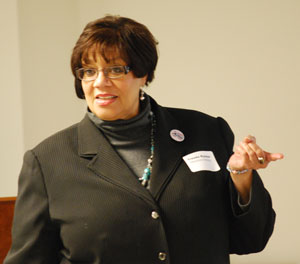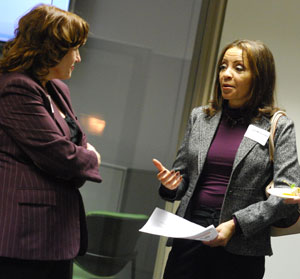Changes Ahead for Workforce Development

Trenda Rusher, head of Washtenaw County's Employment Training & Community Services (ETCS) department, led a joint meeting of the Workforce Development and Community Action boards on Monday. (Photos by the writer.)
The Washtenaw County department that Trenda Rusher supervises is undergoing transition, and not just because the long-time workforce development manager is retiring.
At Monday’s annual joint meeting of the two boards that oversee the county’s Employment Training & Community Services (ETCS) department, Rusher spoke of several other changes – from the dramatic growth of revenues, thanks to federal stimulus dollars, to the equally dramatic increase in demand for services, due to Michigan’s economic plight and the implosion of the auto industry.
And as Rusher departs – after nearly three decades with the county, she’s heading to Washington, D.C. to start her own consulting business and to be near her twin daughters – the new county administrator will be looking at possibly reorganizing the operations that serve as a conduit for millions of federal, state and local dollars.
Verna McDaniel, the deputy county administrator who’s expected to replace retiring administrator Bob Guenzel, spoke to ETCS staff and members of both boards on Monday, saying “we will be looking at all options.” No decisions have been made – a planning team will be meeting to lay out a strategy for evaluating what’s next, she said.
ETCS Highlights in 2009
There are 24 members of the Workforce Development Board and 17 members of the Community Action board – about half of the combined group showed up for Monday’s half-day joint meeting. They oversee, respectively, the county’s job training and community services programs that ETCS manages. ETCS director Trenda Rusher spent part of the meeting summarizing what those programs accomplished in 2009.
Stimulus funding is taking the organization’s budget from $8 million to about $20 million, Rusher said. For 2009, the ETCS budget was $13.6 million – with 96% of those funds coming from federal and state grants, and the rest from county appropriations. Additional federal funding has been earmarked for ETCS programs in 2010. Of the $13.6 million budget, 73% of the funds – nearly $10 million – were used for workforce development programs.
The largest program getting stimulus funding through the American Recovery and Reinvestment Act is the county’s weatherization initiative. Last spring, the county was awarded just over $4 million to weatherize up to 600 homes over an 18-month period. [See Chronicle coverage: "County Gets $4.1 million Weatherization Grant"] Previously, the local weatherization program, which serves low- to moderate-income families, had funding for about 100 homes annually, Rusher said.
Some members of the county’s board of commissioners have questioned why more homes haven’t been weatherized by this point. Commissioner Ken Schwartz in particular has voiced concerns about the delay, and at the board’s Dec. 2, 2009 meeting, he asked again for an update. From Chronicle coverage of that meeting:
Patricia Denig, director of planning and operations for the county’s Employment Training & Community Services (ETCS) department, said that the federal program was initially held up because the U.S. Department of Energy – the granting agency – decided to conduct a national prevailing wage survey, and those results weren’t released until August. In September, ETCS issued a request for proposals (RFP) to get bids from local contractors to provide weatherization services. Bids were received and ETCS was ready to sign contracts in early November, Denig said, but local labor organizations raised concerns about whether those bids had been reviewed by the the county’s Construction Unity Board, known as CUB. Now, ETCS was awaiting a decision from CUB.
In a follow-up this week, Curtis Hedger, the county’s corporation counsel, told The Chronicle that those contracts are now being processed without CUB approval. Wage guidelines for the weatherization contractors, which are lower than what CUB would like, are mandated by the federal government. On Monday, Rusher told members of the ETCS oversight boards that “we’re working like crazy” to get the weatherization requests processed. The grant funding must be used by Sept. 30, 2010 March 31, 2012.

Juanita House, right, holds her daughter Olivia Hudson while working on a group exercise at the joint meeting of the county's Workforce Development and Community Action boards. House is a member of the Community Action Board. In the background: Aaron Kraft, who supervises the ETCS weatherization program.
The weatherization program is one of many community services programs that are managed by ETCS. Among its programs, the department provides emergency food assistance and a summer food program for low-income children, health insurance for low-income county residents through the Michigan Enrolls program, and several services for senior citizens, including meals served in community centers and a foster grandparent program.
At Monday’s meeting, Rusher highlighted several workforce programs as well, including the county’s Access Points initiative. A federal program, it provides training to volunteers at faith-based organizations and community centers, which then act as satellite sites for providing employment resources. [.pdf file of Access Point sites and contact information]
There are 36 Access Points in Washtenaw County, Rusher said – more than in the rest of Michigan combined, and the highest number for any other participating region in the country. “They’re like gerbils,” she said. “They just keep growing.” Gov. Jennifer Granholm last year came to a breakfast for Access Point participants, to thank them for “putting Michigan on the map,” Rusher said.
Another highlight of the year was the opening in November of the Career Transition Center, located in downtown Ypsilanti on the second floor of the KeyBank Building at 301 W. Michigan Ave. Monday’s board meeting was held in a conference room in the basement of that building.
Since opening, thousands of people have walked through the center’s doors, Rusher told board members. She cited a head count of over 6,000 people, but then noted that those numbers include duplicative counts, with some people coming to the center multiple times.

George Toles, who works for ETCS corporate and business services, fires up a demo of a practice interview program at the Career Transition Center in Ypsilanti. A webcam mounted on top of the computer monitor records the interviewee. Counselors at the center then help critique the responses. The equipment is also used for employers off-site to conduct actual job interviews.
On Monday, board members attending the half-day joint meeting spent part of the time touring the center, which includes conference rooms, a computer training lab, interview rooms – each with a phone and computer – and a large area with computers and Internet access available for conducting job searches. There’s also a functional gas fireplace in the lobby.
The center serves as an entry point for people accessing the state’s unemployment services, via the Michigan Works! program, as well as a resource for people hoping to change careers. ETCS operates another employment center in Ypsilanti as well, at 304 Harriet St.
While both centers offer classes and help in identifying resources for job seekers, the newer Career Transition Center encounters more people who have never previously been unemployed. It’s often an emotional experience, said Rhonda Williams, one of the career counselors on staff. “We have to be Dr. Phil sometimes,” she told The Chronicle.
Update on the Future of ETCS
In reassuring ETCS staff about the upcoming transition, there was an element of Dr. Phil in the remarks of Verna McDaniel, deputy county administrator, who spoke to staff and board members on Monday, The department employs 22 county staff, plus about 65 contract employees.
McDaniel is the sole candidate being considered at this point to replace county administrator Bob Guenzel, who also dropped by the Monday event. She was interviewed by the county board of commissioners on Thursday – an interview that Guenzel characterized in his remarks on Monday as “superb.”
McDaniel told the ETCS crowd that she didn’t want to presume she’d be the next administrator, but she said that county administration would work closely with the leadership of the boards and with staff in the coming weeks. She pledged to provide frequent updates about plans for the department.

Verna McDaniel, right, talks with Jenny Bivens, workforce development manager, at the county's Career Transition Center in downtown Ypsilanti. McDaniel, deputy county administrator, spoke to ETCS staff and the joint meeting of the Workforce Development and Community Action boards on Monday.
Whoever is appointed by the board of commissioners on Feb. 3 will have their hands full, McDaniel said. To help with that transition, she and Guenzel have formed a team to work on a smooth hand-off between administrators and to lay some groundwork for the future. There are several opportunities, she said, given the retirements of both Rusher and Peter Ballios, the county’s finance director.
They’ll be looking at all options, she said, but they haven’t made any decisions “so don’t feel we have secrets or anything like that.” There’s no need to panic, she added, urging people not to speculate or spread rumors about what might be happening.
What they’ll be doing is laying out a process by which to make decisions, she said. They’ll be seeking staff and board input, she added: “You’re going to be seeing a lot of me.”
On the board level, some reorganization is already occurring: the Workforce Development and Community Action boards have combined their leadership into a joint executive committee, co-chaired by Keith Peters and Mike DuRussel.
But other possible changes aren’t yet in place. In response to questions from ETCS staff, McDaniel said they’ll have a plan for the ETCS leadership transition by March 31. Rusher, whose retirement took effect at the end of 2009, has agreed to stay in her position through the end of March. McDaniel said they don’t yet know if a search for Rusher’s replacement will be local or national. The board of commissioners has asked the county administration to look at “other permutations of leadership,” she said.
When one staff member stated that the department needs an interim leader after March, McDaniel agreed. She said they didn’t want to rush into naming an interim, but that by the time Rusher leaves, “I’m almost certain that will be necessary.”



